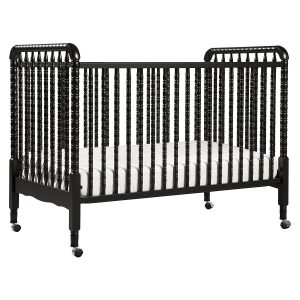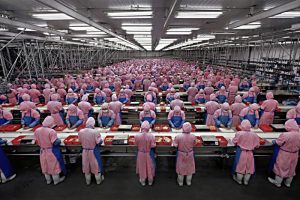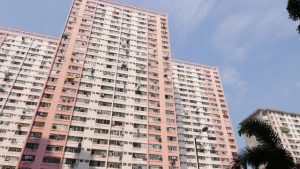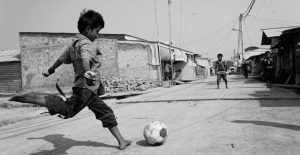Although he would at times forget the scampering and rustling that marked people amongst the monoliths, like the worms in a graveyard or rats in a sinking ship, at moments he would look up to see the lit windows of a thousand tiny lives, made small by the distance down the boulevard, and smaller still in apartments which didn’t allow them to expand into anything more than an infestation. It was then that he recognized that although the buildings bore the parasites with the stoicism that comes with the knowledge of extermination, the people lived their moment on sufferance and it would take more than the cost of their rent to give them back the open skies and unfenced vacant lots.
lives, made small by the distance down the boulevard, and smaller still in apartments which didn’t allow them to expand into anything more than an infestation. It was then that he recognized that although the buildings bore the parasites with the stoicism that comes with the knowledge of extermination, the people lived their moment on sufferance and it would take more than the cost of their rent to give them back the open skies and unfenced vacant lots.
Compartmentalized from the moment they slipped from the womb, they fell from one rigid box to another, their uneasy path littered with the castoff shells of past occupancy, of the jerk and fall that was being tipped out of the soft womb. From that soothing roundness, they fell into the barred walls of the cradle,  and occasionally a hang reached from the sky and tilted it alarmingly back and forth. The cradle led to a small room housing a bed and other boxes, and they were meant to stay there for a half dozen years or so until they graduated to school. Education, they had to learn quickly, was a system for boxing, a long conveyer belt that led the
and occasionally a hang reached from the sky and tilted it alarmingly back and forth. The cradle led to a small room housing a bed and other boxes, and they were meant to stay there for a half dozen years or so until they graduated to school. Education, they had to learn quickly, was a system for boxing, a long conveyer belt that led the still-soft mind to desk to room to larger room and back again. Viewed from the outside, a privilege the child was afforded briefly as they stepped from the bus, the school was built from a giant’s play, the unsteady blocks leaning on one another until a hand reached down to sweep them to the floor.
still-soft mind to desk to room to larger room and back again. Viewed from the outside, a privilege the child was afforded briefly as they stepped from the bus, the school was built from a giant’s play, the unsteady blocks leaning on one another until a hand reached down to sweep them to the floor.
After school they found a job somewhere amongst the huge warehouses and skyscrapers that dwarfed them and their concerns. Along another conveyor they would build boxes with their roughening hands until the hollering boss would lean out over the fence that protected him from his worker and pull the cord which announced they could eat or, later in the day, go home. By this time they would have found one of the tiny apartments and if their evenings were not too tired, or when the weekend mornings found them fresh enough, they would work on conceiving another baby for the boxes.
they would build boxes with their roughening hands until the hollering boss would lean out over the fence that protected him from his worker and pull the cord which announced they could eat or, later in the day, go home. By this time they would have found one of the tiny apartments and if their evenings were not too tired, or when the weekend mornings found them fresh enough, they would work on conceiving another baby for the boxes.
When Tom imagined an entire system built to serve square walls and the tiny insects that lived in the cracks  and amongst the insulation of buildings that endured their presence, he always saw himself as though from above, or a long distance, a miniscule crooked figure angled away from the street and pacing the confines of a tiny room. He thought about how he’d been brought up in the open air, and had come like a million others, drawn to the city like a moth to a candle on a windowsill, his eyes wide with the wonder of humans living in droves, great open-mouthed hordes rushing to and fro with the commuter traffic day, and collapsing in exhaustion at night.
and amongst the insulation of buildings that endured their presence, he always saw himself as though from above, or a long distance, a miniscule crooked figure angled away from the street and pacing the confines of a tiny room. He thought about how he’d been brought up in the open air, and had come like a million others, drawn to the city like a moth to a candle on a windowsill, his eyes wide with the wonder of humans living in droves, great open-mouthed hordes rushing to and fro with the commuter traffic day, and collapsing in exhaustion at night.
He acknowledged that the buildings were not alien constructions, that they had been designed and erected by those who thought about making money from their fellow humans, but that took away none of the horror of living in the midst of the roiling crowds, and the feeling of scurrying on the bottom of a pit. There were those who cried foul and left, to end their days rubbing their limbs against the rough bark of the forest trees and grubbing in the dirt for food, but many more treasured a fantasy of themselves above the common run, that far above the anthill they would one day be able to look down, their fellow hurrying back and forth far below, and they would be able to parade their success and escape before others who thought to dream their way out of the shared nightmare.
fellow humans, but that took away none of the horror of living in the midst of the roiling crowds, and the feeling of scurrying on the bottom of a pit. There were those who cried foul and left, to end their days rubbing their limbs against the rough bark of the forest trees and grubbing in the dirt for food, but many more treasured a fantasy of themselves above the common run, that far above the anthill they would one day be able to look down, their fellow hurrying back and forth far below, and they would be able to parade their success and escape before others who thought to dream their way out of the shared nightmare.
Those people became flint-eyed in their quest of the higher box, and they hammered nails into their feet so they might easier climb the backs of their fellow sufferers. They earned their place in the sky, their view from far above the toiling multitudes, but they gained it by way of malice and betrayal, it came at the expense of their better selves, and even when they were as high as they could get, the penthouses on the tallest buildings, their eyes only looked down. They had pinned so many hopes on bettering themselves at the expense of others that they had forgotten about the sky.
Even the lowest worker in the subbasement terror of their daily existence had the occasional beam of sunlight bounce off a glass-sheathed building and into their face. On their weekends they might play accordion along the high wall in which people had confined the river, and for a moment be more than an ant waiting for a magnifying glass.  The penthousers had no such release. Even once they pried their bloody shoes from their feet, their necks were so twisted from their climb that they could no longer look up, and they only found pleasure, their fingers scrabbling on the paper in front of them, in the numbers which traced their success against the losses of the many who had failed.
The penthousers had no such release. Even once they pried their bloody shoes from their feet, their necks were so twisted from their climb that they could no longer look up, and they only found pleasure, their fingers scrabbling on the paper in front of them, in the numbers which traced their success against the losses of the many who had failed.
A vast machine for the grinding of human hamburger, the cities could kill a dream more easily than a man steps on a cockroach, but Tom assured himself that he  knew the story and could therefore evade its most likely outcomes. Somehow there was a middle ground, a vacant lot where kids pried away the fence and kicked a ball above the dust, and he was more determined to find it now that he was old enough to realize it existed. The many cracks and mouse holes meant there were others who had survived a different way, and he was determined to find out their stories, although in the meantime he would be scrabbling in the streets like the rest of them.
knew the story and could therefore evade its most likely outcomes. Somehow there was a middle ground, a vacant lot where kids pried away the fence and kicked a ball above the dust, and he was more determined to find it now that he was old enough to realize it existed. The many cracks and mouse holes meant there were others who had survived a different way, and he was determined to find out their stories, although in the meantime he would be scrabbling in the streets like the rest of them.
